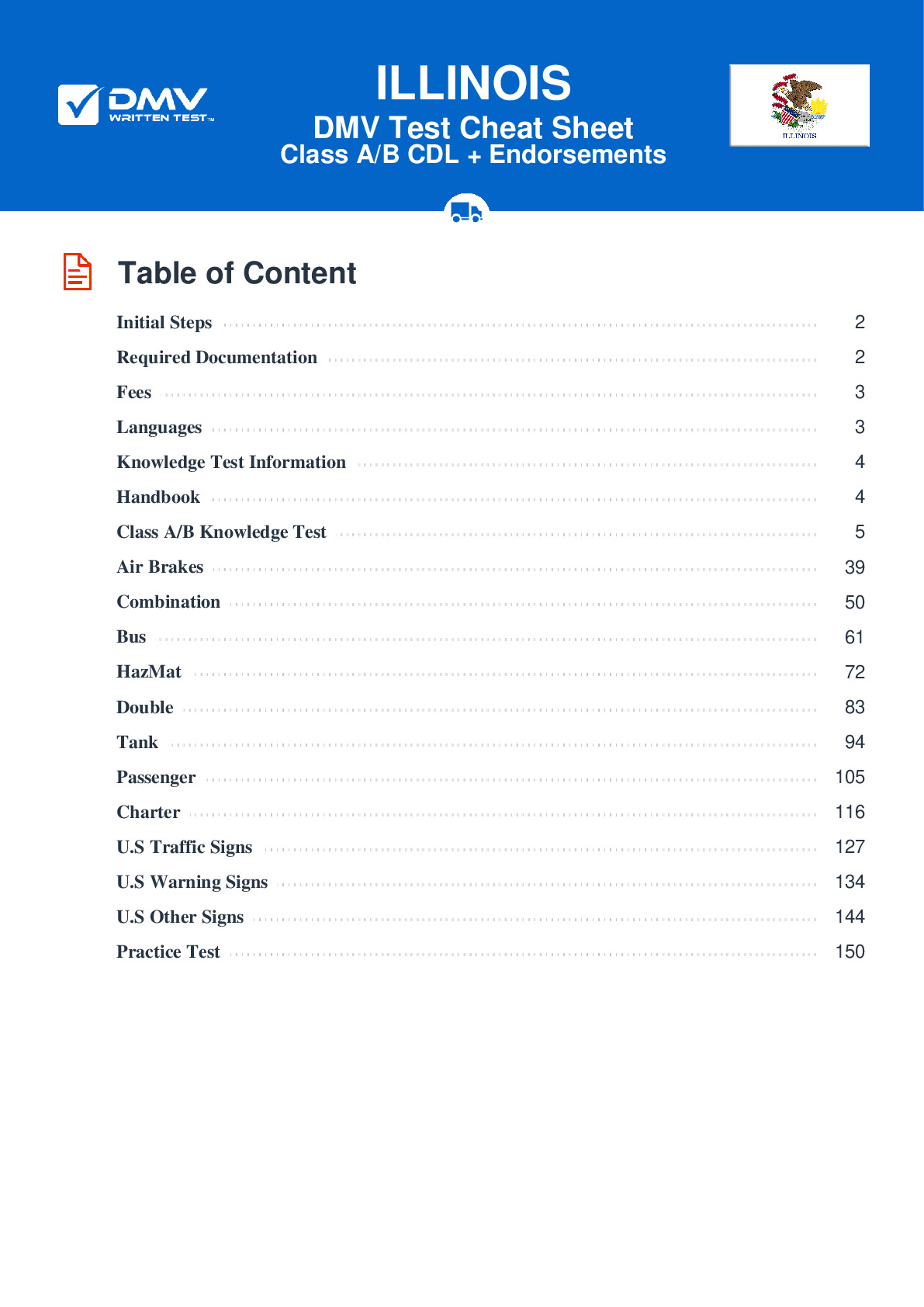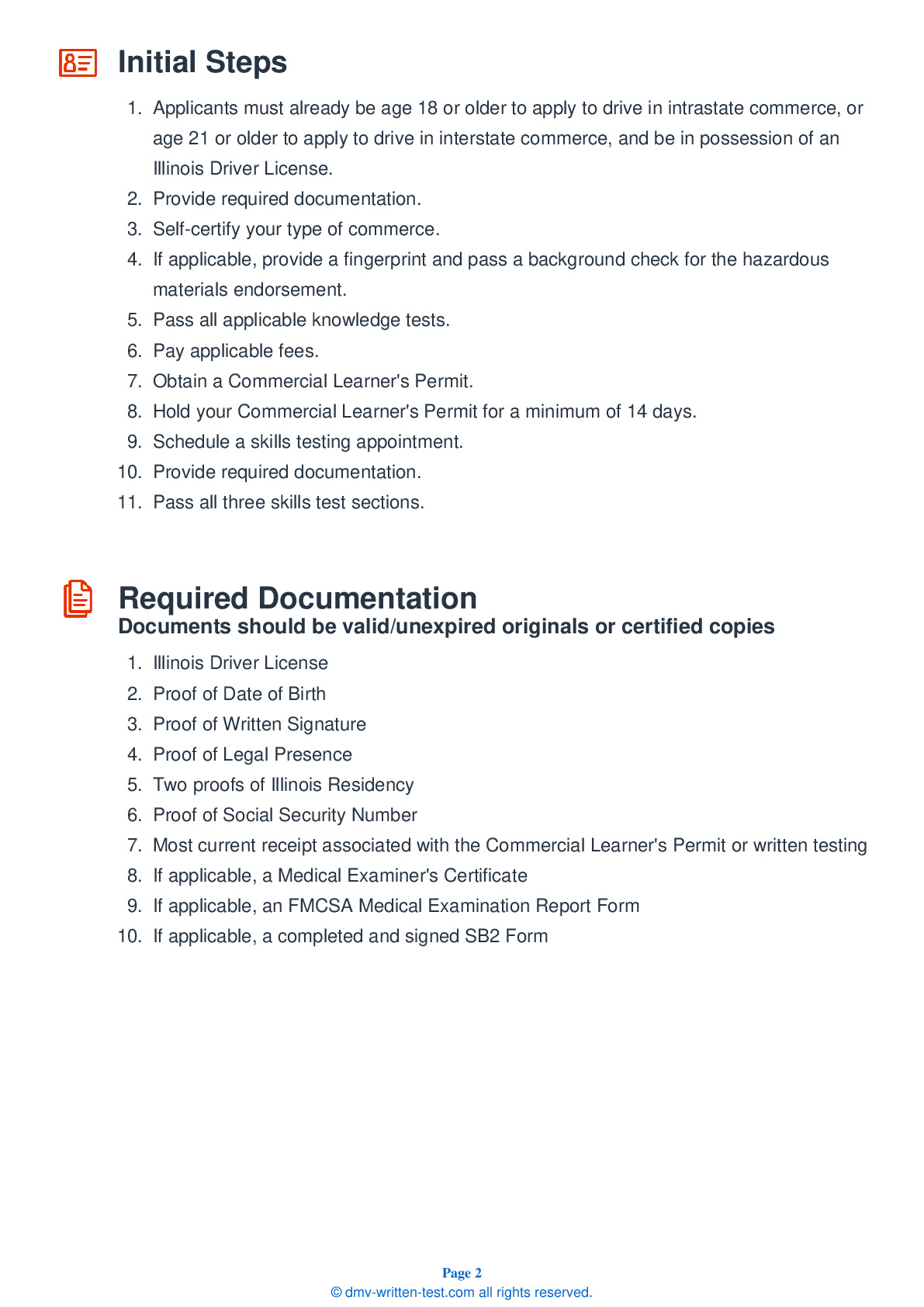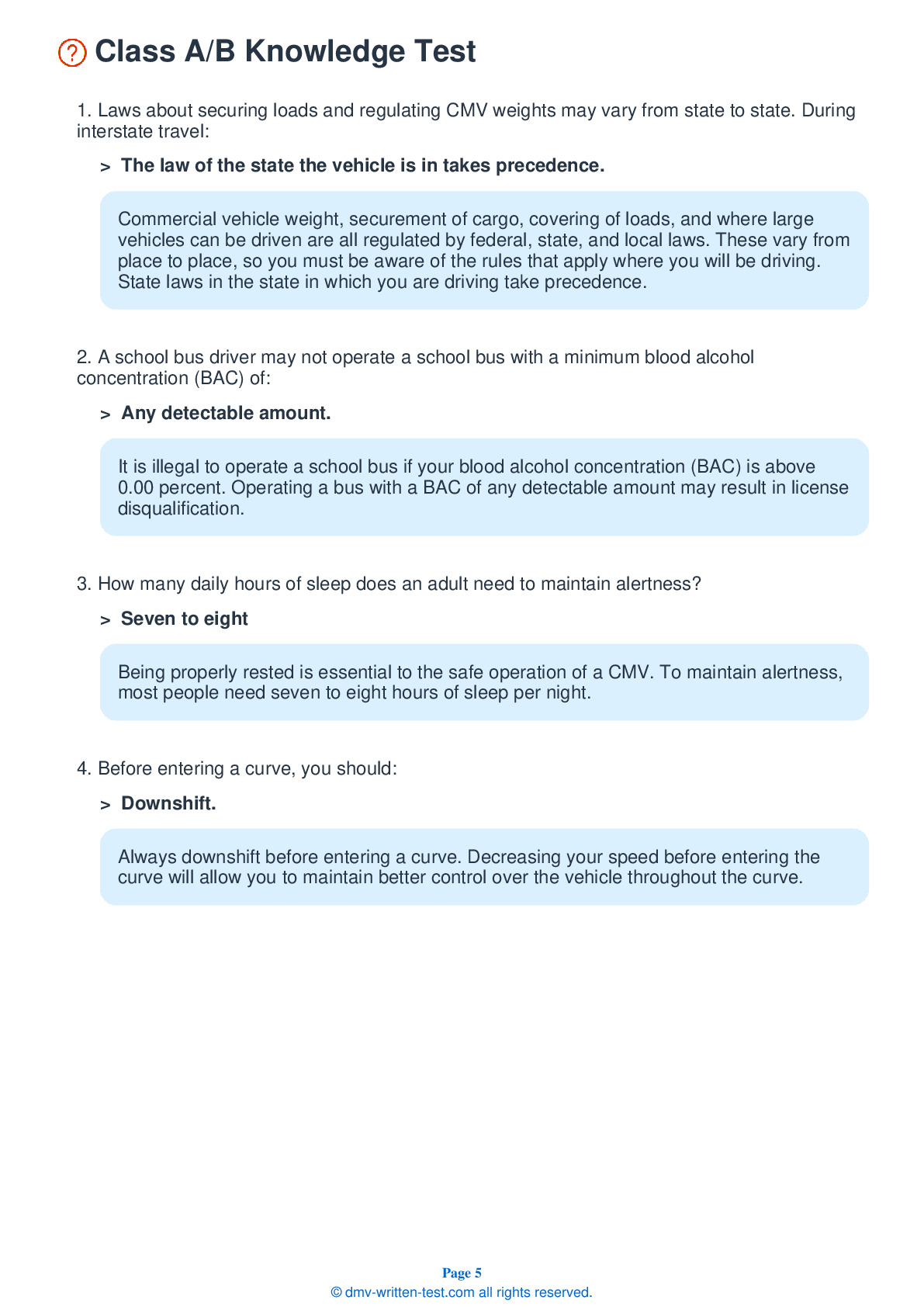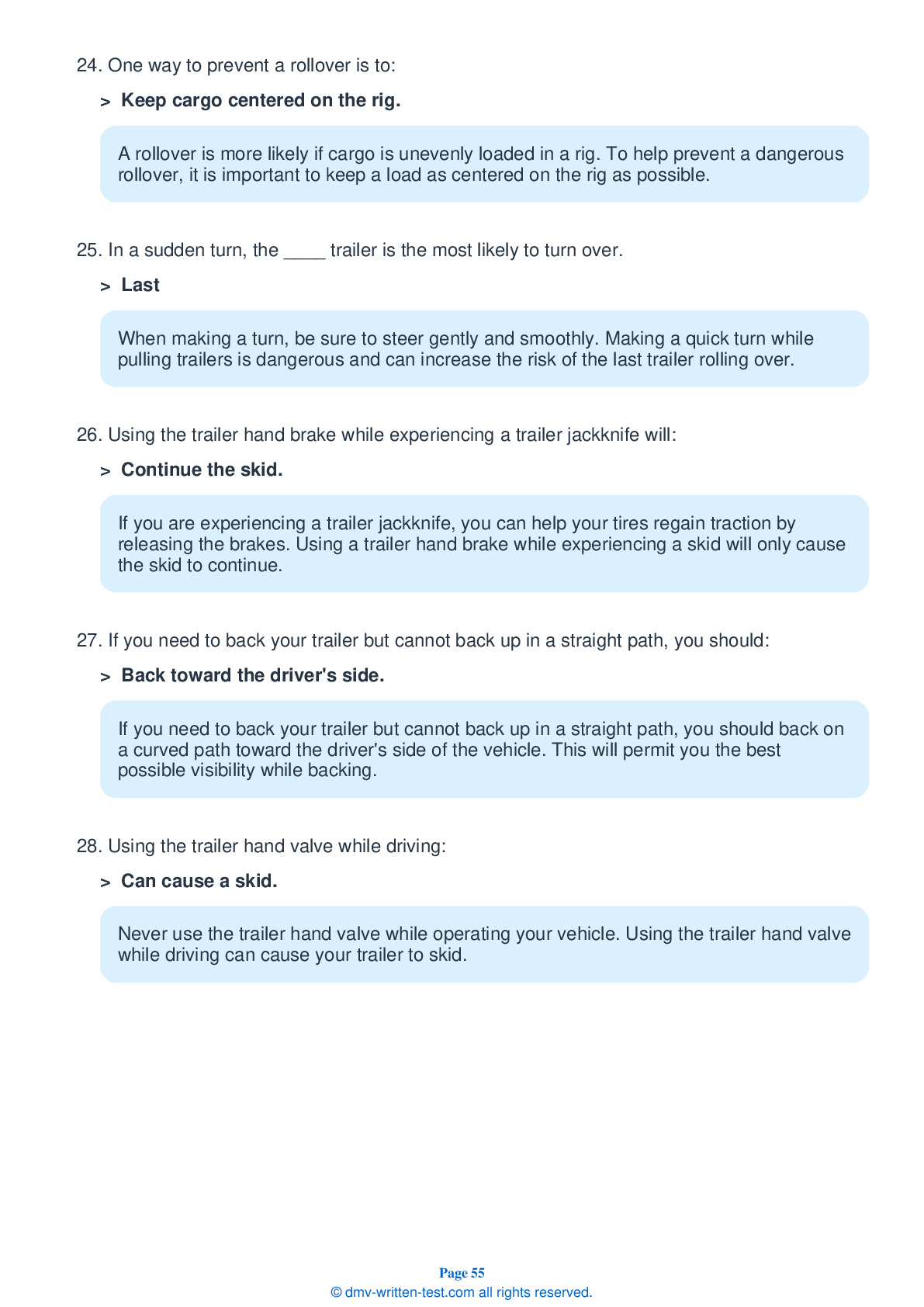
This license is required for driving a single vehicle with a GVWR of more than 26,001 pounds, and a trailer not to exceed 10,000 pounds gross vehicle weight rating, or a vehicle designed to transport 24 or more people (including the.. Read More
This license is required for driving a single vehicle with a GVWR of more than 26,001 pounds, and a trailer not to exceed 10,000 pounds gross vehicle weight rating, or a vehicle designed to transport 24 or more people (including the driver). To receive this license, applicants must pass a 50-question test. To pass, applicants must answer 40 questions correctly. Test questions come from the Illinois Commercial Drivers License Study Guide. Questions come from chapters covering: Introduction, Driving Safely, Transporting Cargo Safely, Air Brakes (if applicable), Combination Vehicles, Pre-Trip Vehicle Inspection Test, Basic Vehicle Control Skills Test and On-Road Driving. Endorsements that may be used with a Class B CDL are: Hazardous materials, Tank, Passenger, HazMat and Tank, Air Brakes, School bus and Charter.
Number of Question 50 Passing Score 40If the road appears to be wet but the wheels of other vehicles are no longer generating spray, ice has formed on the road. Drive with extra caution when operating on wet or icy roads.
When transporting cargo on a flatbed trailer, you should use at least one tie-down for every 10 feet of cargo. Any cargo, no matter how small, should be restrained by a minimum of two tie-downs.
If you must drive slowly, you should warn drivers behind you by turning on your emergency flashers, as long as local law permits their use.
When inspecting a vehicle with air brakes that has a belt-driven air compressor, you should check the condition and tightness of the belt. It should be in good condition.
Using the brakes after a tire failure could cause you to lose control of your vehicle. Unless you're about to hit something, stay off of the brake until the vehicle has slowed sufficiently.
An alcohol evaporator can help prevent ice from building up in an air brake system. In cold weather, the evaporator should be checked and refilled every day.
Reaction distance is the distance traveled between the moment you mentally recognize a hazard and when you physically hit the brakes.
99.2% of people who use the cheat sheet pass the FIRST TIME




A Class B CDL (Commercial Driver's License) in Illinois allows drivers to operate a single vehicle with a weight of 26,001 pounds or more and/or a combination of vehicles with a total weight of less than 26,001 pounds. This license also allows drivers to operate vehicles designed to transport 16 or more passengers (including the driver) or hazardous materials.
Here are the steps to obtain a Class B CDL license in Illinois:
1. Obtain and read the Illinois Commercial Driver's License Study Guide.
2. Obtain and hold a valid Illinois driver's license.
3. Meet the medical requirements by passing a physical examination and obtaining a Medical Examiner's Certificate.
4. Obtain a Commercial Learner's Permit (CLP) by passing the written general knowledge test, as well as any other additional tests required for specific endorsements (such as passenger or hazardous materials endorsements).
5. Practice driving with your CLP for at least 14 days before taking the road skills test.
6. Schedule an appointment with an approved CDL testing facility to take the road skills test, which includes a pre-trip inspection, basic control skills test, and an on-road driving test.
7. Pass all portions of the road skills test.
8. Pay all required fees and obtain your Class B CDL license.
It is important to note that additional endorsements may be required for specific types of Class B vehicles or cargo, such as tanker vehicles or double/triple trailers. Additionally, maintaining a Class B CDL license requires regular medical evaluations and compliance with all state and federal regulations related to commercial driving.
With a Class B CDL license in Illinois, you are authorized to operate the following vehicles:
1. A single vehicle with a gross vehicle weight rating (GVWR) of 26,001 pounds or more.
2. A combination of vehicles with a total GVWR of less than 26,001 pounds, but with a towed vehicle that has a GVWR of more than 10,000 pounds (such as a large trailer or other equipment).
3. Vehicles designed to transport 16 or more passengers (including the driver) such as buses or vans used for public transportation or school buses.
4. Vehicles used to transport hazardous materials in quantities requiring placards.
It is important to note that additional endorsements may be required for specific types of vehicles or cargo, such as tankers or double/triple trailers. Additionally, it is important to comply with all state and federal regulations related to commercial driving and maintain a good driving record while holding a Class B CDL license.
The requirements to obtain a Class B CDL (Commercial Driver's License) license in Illinois are as follows:
1. You must be at least 18 years of age to drive within the state of Illinois or 21 years of age to drive across state lines or transport hazardous materials.
2. You must have a valid Illinois driver's license.
3. You must pass a Department of Transportation (DOT) physical exam and obtain a Medical Examiner's Certificate.
4. You must pass the written tests, which include the general knowledge test and any additional tests required for specific endorsements, such as passenger or hazardous materials endorsements.
5. You must obtain a Commercial Learner's Permit (CLP) by passing the written tests.
6. You must hold your CLP for at least 14 days before taking the road skills test.
7. You must pass the road skills test, which includes a pre-trip inspection, basic control skills test, and an on-road driving test.
8. You must pay all required fees and obtain your Class B CDL license.
It is important to note that additional endorsements may be required for specific types of vehicles or cargo, such as tankers or double/triple trailers. Additionally, it is important to comply with all state and federal regulations related to commercial driving and maintain a good driving record while holding a Class B CDL license.
In Illinois, you must be at least 18 years old to obtain a Class B CDL license and operate a commercial vehicle within the state. However, if you plan to operate a commercial vehicle across state lines or transport hazardous materials, you must be at least 21 years old. This is due to federal regulations set by the Federal Motor Carrier Safety Administration (FMCSA). Additionally, some employers may have their own age requirements for drivers, so it is important to check with your employer before pursuing a Class B CDL license.
Whether you need endorsements for a Class B CDL license depends on the specific type of vehicle or cargo you plan to transport. Below are the endorsements that may be required for a Class B CDL license:
1. Passenger (P) endorsement: This is required for drivers who plan to operate vehicles that are designed to transport 16 or more passengers, including the driver.
2. School Bus (S) endorsement: This is required for drivers who plan to operate a school bus.
3. Tanker (N) endorsement: This is required for drivers who plan to operate a vehicle that transports liquids or gases in tanks that have a capacity of 1,000 gallons or more.
4. Hazardous Materials (H) endorsement: This is required for drivers who plan to transport hazardous materials, which are defined by the federal government as substances or materials that pose a risk to public safety or the environment.
5. Combination Tank and Hazardous Materials (X) endorsement: This is required for drivers who plan to transport both hazardous materials and liquids or gases in tanks.
It is important to note that obtaining endorsements typically requires passing additional written tests and meeting certain requirements beyond those needed for a standard Class B CDL license.
The Class B CDL skills test is divided into three parts: pre-trip inspection, basic vehicle control, and on-road driving. Below is a breakdown of what is involved in each part of the test:
1. Pre-trip inspection: In this part of the test, you will be asked to inspect your vehicle and identify any potential safety hazards. You will be required to check the brakes, steering, lights, tires, and other important components of the vehicle. You must demonstrate your knowledge of the vehicle and how to identify any issues that may prevent it from operating safely.
2. Basic vehicle control: In this part of the test, you will be asked to demonstrate your ability to control the vehicle in a variety of situations. You may be asked to perform tasks such as straight-line backing, offset backing, parallel parking, and docking. You must demonstrate your ability to maneuver the vehicle safely and accurately.
3. On-road driving: In this part of the test, you will be asked to drive on public roads while being evaluated by an examiner. During this portion of the test, you must demonstrate your ability to operate the vehicle safely and obey traffic laws. The examiner will evaluate your ability to make turns, change lanes, maintain proper speed and following distance, and respond appropriately to traffic signals and signs.
Overall, passing the Class B CDL skills test requires a strong understanding of commercial driving techniques and a commitment to safety on the road.
Yes, there are certain restrictions and limitations for drivers with a Class B CDL license. The most common restrictions and limitations include:
1. Vehicle weight limitation: Drivers with a Class B CDL license are limited to operating vehicles with a Gross Vehicle Weight Rating (GVWR) of 26,001 pounds or more. If the vehicle being operated has a GVWR of less than 26,001 pounds, but is designed to transport 16 or more passengers (including the driver) or hazardous materials, a Class B CDL with the appropriate endorsements is still required.
2. Towing limitation: Drivers with a Class B CDL license are allowed to tow vehicles with a GVWR of up to 10,000 pounds.
3. Passenger limitation: Drivers with a Class B CDL license are allowed to transport up to 16 passengers (including the driver).
4. Endorsement requirements: Drivers with a Class B CDL license may be required to obtain certain endorsements in order to operate specific types of vehicles or transport certain types of cargo.
It is important for drivers to be aware of any restrictions or limitations on their Class B CDL license in order to ensure compliance with state and federal regulations and avoid any potential penalties or violations.
Yes, the Class B CDL written test can be taken in a language other than English in the state of Illinois. The Illinois Secretary of State's office offers the written test in several languages, including Spanish, Polish, Chinese, and Korean. However, it is important to note that the skills test (driving test) is only conducted in English.
In order to take the written test in a language other than English, you must inform the Secretary of State's office when you schedule your appointment. You may be required to bring a qualified interpreter with you to assist with the testing process.
It is important to note that while taking the written test in your native language may be helpful, it is still important to have a solid understanding of English for communication purposes on the road and for understanding road signs and signals.
Yes, the Illinois Secretary of State's office provides accommodations for individuals with disabilities who take the Class B CDL written test. Some of the accommodations that may be available include:
1. Extended testing time
2. Large-print or Braille test materials
3. Audio or oral testing
4. Use of a reader or scribe
To request accommodations for the Class B CDL written test, you must inform the Secretary of State's office when you schedule your appointment. You will be required to provide documentation of your disability and the specific accommodations you require.
It is important to note that accommodations must be requested in advance, and may take some time to arrange. To ensure that you receive the necessary accommodations, it is recommended that you make your request as early as possible before your scheduled test date.
If you fail the Class B CDL written test in Illinois, you may retake the test. However, there are certain restrictions on how many times you can retake the test and how long you must wait between attempts.
If you fail the written test on your first attempt, you may retake the test the next business day. If you fail the test a second time, you must wait at least 7 days before retaking it. If you fail the test a third or subsequent time, you must wait at least 15 days before retaking it.
It is important to note that there is a fee for each attempt at the written test, and these fees are non-refundable. Therefore, it is recommended that you thoroughly study and prepare for the exam before taking it to increase your chances of passing on your first attempt.